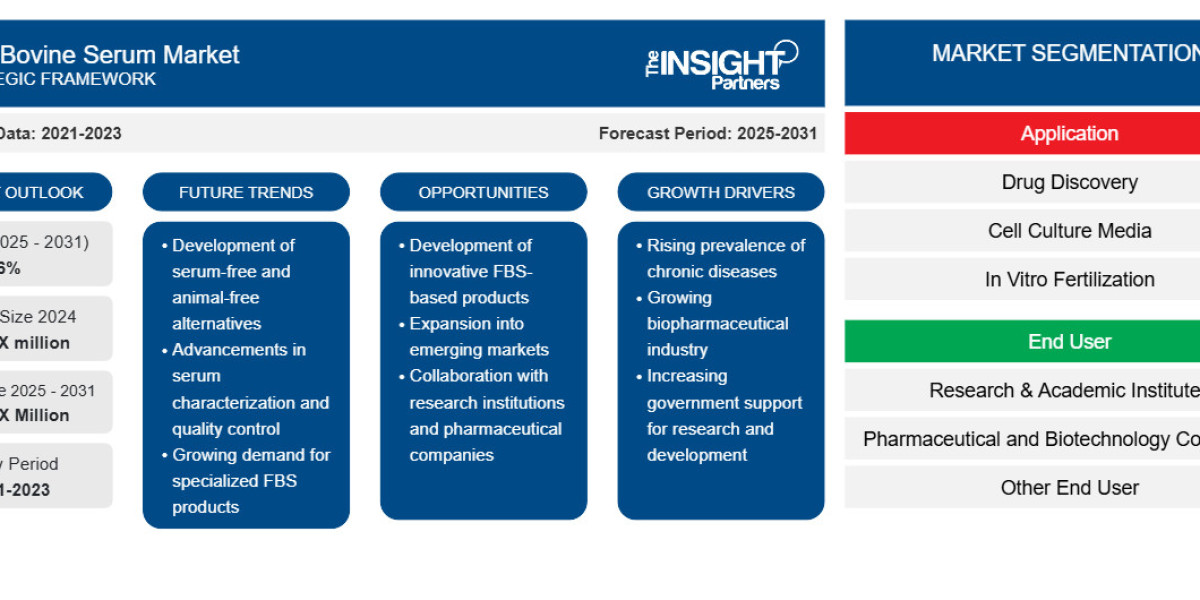The Fetal Bovine Serum Market is a critical component of the life sciences industry, playing a vital role in cell culture, biopharmaceutical production, and various research applications. FBS, derived from the blood of bovine fetuses, is a complex mixture of growth factors, hormones, and other essential nutrients that make it an indispensable supplement for cell growth and maintenance in vitro.
Market Size and Growth:
The market is a substantial and growing market. While precise figures fluctuate based on the source and year, the Fetal Bovine Serum market is projected to expand at a compound annual growth rate (CAGR) of 6% is anticipated from 2024 to 2031, reflecting the continued demand for FBS in various applications.
Key Market Drivers:
- Growing Biopharmaceutical Industry: The rapid expansion of the biopharmaceutical industry, particularly the development of cell-based therapies and vaccines, is a major driver of the Fetal Bovine Serum market.
- Increasing Research Activities: Fetal Bovine Serum is widely used in research across various fields, including cell biology, immunology, and oncology. The increasing investment in research and development contributes to market growth.
- Rising Demand for Cell Culture Media: Fetal Bovine Serum is a crucial component of cell culture media, which is used extensively in research, diagnostics, and bioproduction.
- Advancements in Cell Culture Technologies: Innovations in cell culture techniques and the development of new cell lines are increasing the demand for Fetal Bovine Serum.
- Diagnostic Applications: Fetal Bovine Serum is used in various diagnostic assays and tests, contributing to the market's growth.
Market Challenges:
- Price Fluctuations: The price of Fetal Bovine Serum can fluctuate significantly due to factors like supply and demand, disease outbreaks affecting cattle populations, and regulatory changes.
- Ethical Concerns: The sourcing of Fetal Bovine Serum raises ethical concerns related to animal welfare. Efforts are underway to develop alternatives to Fetal Bovine Serum.
- Stringent Regulations: The production and distribution of Fetal Bovine Serum are subject to strict regulations to ensure quality and safety.
- Availability and Traceability: Ensuring the consistent availability and traceability of Fetal Bovine Serum can be challenging due to its biological origin.
Fetal Bovine Serum Market Opportunities:
- Development of Serum Alternatives: Research and development efforts are focused on creating serum-free media and synthetic alternatives to Fetal Bovine Serum, which could offer more consistent and ethically sourced solutions. This presents both a challenge and an opportunity.
- Growing Demand in Emerging Markets: Developing economies with growing biopharmaceutical industries and research activities offer significant growth potential for the Fetal Bovine Serum market.
- Technological Advancements: Improvements in cell culture technologies and the development of specialized Fetal Bovine Serum products for specific applications can create new market opportunities.
- Focus on Quality and Traceability: Suppliers that can ensure high quality, traceability, and ethical sourcing of Fetal Bovine Serum are likely to gain a competitive advantage.
Trends Shaping the Future:
- Increased Focus on Serum-Free Media: The development and adoption of serum-free media are expected to increase, although Fetal Bovine Serum will likely remain a crucial component for certain applications.
- Emphasis on Ethical Sourcing: Suppliers are increasingly focusing on ethical sourcing practices and transparency in their supply chains.
- Automation and High-Throughput Screening: The use of automation and high-throughput screening in cell culture is driving demand for standardized and high-quality Fetal Bovine Serum.
Conclusion:
The Fetal Bovine Serum Market is essential to the life sciences and biopharmaceutical industries. While challenges related to price fluctuations, ethical concerns, and regulations exist, the market is expected to continue its growth trajectory. The development of serum alternatives and the increasing demand in emerging markets are likely to shape the future of the FBS market. The focus on quality, traceability, and ethical sourcing will be increasingly important for suppliers in this dynamic market.


